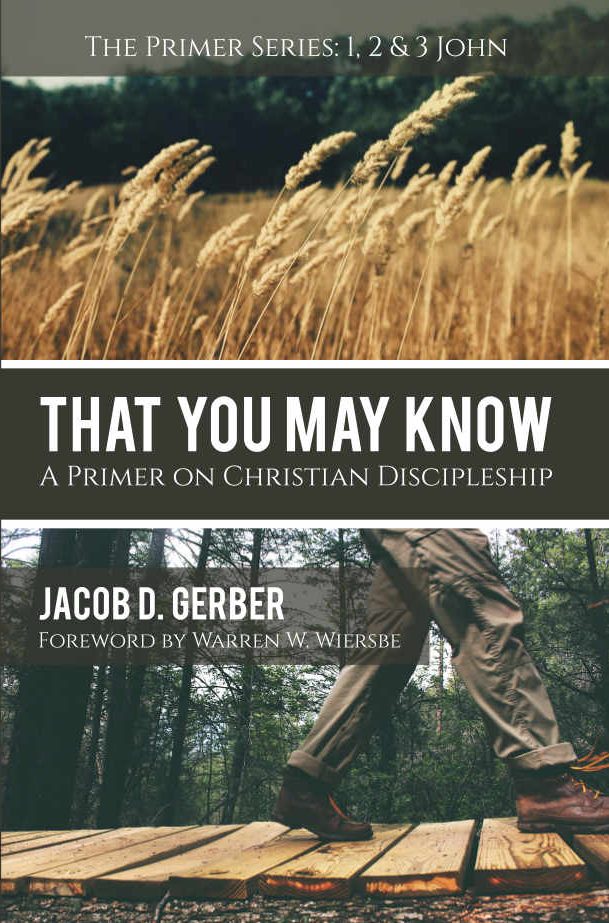Books

While there are many books written about Christian discipleship, there are not nearly enough books on discipleship that primarily expound the Bible itself. The Apostle John wrote three letters, however, with the main purpose of helping disciples to grow.
That You May Know: A Primer on Christian Discipleship is an enriching study that will lead you through John’s teaching on following Jesus as a disciple.
This book is more than a commentary and more than a topical book on the subject of Christian discipleship. Instead, this is a primer on Christian discipleship written as a careful reading of God’s word in 1, 2 & 3 John. It’s ideal for your own individual devotional reading or as a helpful resource for your group Bible study.
Download the First Two Chapters of That You May Know for Free
Bible Studies: Paul's Letter to the Philippians
Studies from my forthcoming pastoral commentary on Paul’s Letter to the Philippians, Have This Mind: A Primer on the Cruciform Life.
Access the complete set of Bible studies from Philippians here.
Bible Studies: The Gospel of John
Access the complete set of Bible studies from the Gospel of John here.
Bible Studies: The Book of Genesis
Access the complete set of Bible studies from Genesis here.
Genesis 8:20–9:17: Covenant of Preservation
God makes a covenant of preservation with Noah to carry creation forward. A covenant of redemption, however, will come elsewhere. (Exposition of Genesis 8:20–9:17)
Genesis 8:1–19: New Creation
The Flood was a de-creation, and disembarking from the ark is a new creation that foreshadows the ultimate new creation. (Exposition of Genesis 8:1–19)
Genesis 6:9–7:24: Judgment and Salvation
Is God a God of judgment and wrath, or is he a God of salvation and grace? Can we reduce God to one side or the other? (Exposition of Genesis 6:9–7:24)
Genesis 6:1–8: Apostasy
What does it mean for the sons of God to marry the daughters of men? Why does that sin spiral into God’s sending the flood? (Exposition of Genesis 6:1–8)
Genesis 4:17–5:32: The Offspring of the Woman
After Cain murders Abel, what hope is there for humanity in the world? Will all humankind go the way of Cain, or will God preserve a faithful remnant? (Exposition of Genesis 4:17–5:32)
Genesis 4:1–16: The Offspring of the Serpent
The first two children born to Adam and Eve represent two fundamentally different categories: the offspring of the woman and the offspring of the serpent. (Exposition of Genesis 4:1–16)
Bible Studies: Paul's First Letter to the Corinthians
Access the current set of Bible studies from 1 Corinthians here.
Bible Studies: The Letters of John
Access the complete set of Bible studies from the Letters of John here.
Bible Studies: The Gospel of Luke
Access a handful of Bible studies from the Gospel of Luke here. These were studies written during the Advent season of 2018. At the moment, I do not have plans to continue working through the Gospel of Luke; however, I wanted to make these few studies available online for whomever may benefit from them.
Bible Studies: The Book of Ecclesiastes
Access the complete set of Bible studies from the Book of Ecclesiastes here.
Bible Studies: The Gospel of Matthew
Matthew 16:1–4: Seeking for a Sign
When the Pharisees and Sadducees demand a sign from heaven, Jesus tells them to seek Christ in the signs that he has provided. (Exposition of Matthew 16:1–4)
Matthew 15:29–39: Crumbs to Feed Four Thousand
In the feeding of the four thousand, Jesus extends covenant blessings to Gentiles because the Son of David will fully bless the nations. (Exposition of Matthew 15:29–39)
Matthew 15:21–28: Crumbs from the Table of the Son of David
When a Canaanite woman confronts Jesus in the region of Tyre and Sidon, it signals the beginning of a new era, where the Son of David will reign over the nations. (Exposition of Matthew 15:21–28)
Matthew 15:10–20: The Defilement of Sin
Jesus teaches that we do not enter his kingdom through mechanical ceremonies, but by repentance and faith. Sin defiles the soul, not ceremony. (Exposition of Matthew 15:10–20)
Matthew 15:1–9: The Anatomy of Legalism
Jesus gives a devastating critique of legalism, showing that legalism looks for loopholes and creates counterfeit commandments. (Exposition of Matthew 15:1–9)
Matthew 14:22–36: Salvation from the Son of God
While we may sometimes feel that Jesus has left us alone, he is praying for us. Even more, Jesus saves us from storms. (Exposition of Matthew 14:22–36)












